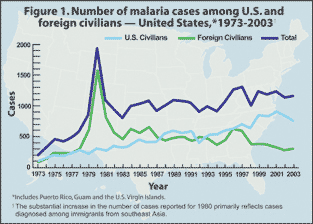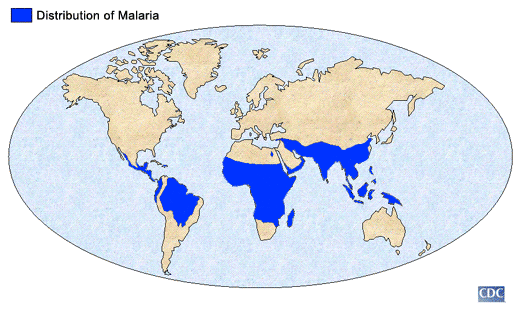 |
 |
| Malaria
Home > |
 |
Latest United States Malaria Disease Surveillance Report -
An Argument For Continuing Vigilance
|
 |
Travelers are implicated in most cases, but malaria-carrying mosquitoes can still transmit the disease within the United States...
|
|
 Number of Malaria cases among U.S. and foreign civilians, by year, 1973 to 2003.
(CDC graph) Number of Malaria cases among U.S. and foreign civilians, by year, 1973 to 2003.
(CDC graph) |
 |
Even though malaria has been eradicated from the United States since 1951, U.S. residents remain at risk, especially when traveling in malaria-endemic countries.
CDC released recently its Malaria Surveillance Summary for 2003. Domestic malaria surveillance helps CDC provide recommendations to keep travelers healthy and can identify episodes of malaria transmission in the United States.
CDC received reports of 1,278 cases of malaria, with seven deaths, that occurred in 2003 in the United States. All but ten cases were in persons who had traveled to a malaria risk area. Of the ten cases in persons who had not traveled to a malaria risk area, eight were caused by local mosquitoborne transmission within the United States.
|
 |
| Malaria risk areas in the world. In 2003, of 1,201 U.S. imported cases of malaria with known region of acquisition, 70% were acquired in Africa. Countries where the highest numbers of cases were acquired were Nigeria (240 cases), Ghana (122 cases) and India (100 cases.) (CDC graph) |
 |
Prevention in Travelers
Malaria can be a fatal disease for travelers. But it can be prevented by taking one of the recommended chemoprophylactic drug regimens appropriate for the region of travel, and by using personal protection measures to prevent mosquito bites.
The surveillance summary showed that among the U.S. civilians who acquired malaria abroad, at least 82% had taken either no prophylaxis, or prophylaxis regimens that differed from those recommended by CDC. Travelers should take the recommended antimalarial drug, at the correct doses, and for the entire recommended course.
The surveillance summary also showed that more than half (54%) of the U.S. civilians who developed malaria were immigrants living in the United States who had returned to their country of origin to visit friends and relatives. This group of travelers and their healthcare providers need to be more aware of the importance of chemoprophylaxis and other protective measures.
Travelers can obtain recommendations from CDC concerning malaria prevention by calling 1-877-FYI-TRIP or by accessing CDC’s Web sites on Travelers' Health and on Malaria.
Early Diagnosis and Treatment
.jpg) |
 |
Malaria is a potentially fatal disease that can be prevented and treated. Travelers to a malaria risk area should visit a travel clinic 4-6 weeks before travel, for advice about how to prevent malaria and prescriptions for antimalarial drugs. (CDC photo)
|  |
 |
Malaria infections can be fatal if not diagnosed and treated promptly. Among the seven fatal cases of malaria in 2003, the diagnosis was not made prior to the patients’ deaths in two cases, and the patients dangerously delayed their visits to a healthcare provider in three cases. Any person who has been to a malaria risk area and who develops fever or influenza-like symptoms within the year after travel should seek medical care immediately and report their travel history to their healthcare provider.
Healthcare providers should elicit a travel history from all patients who present with symptoms consistent with malaria. Clinicians seeking assistance with the
diagnosis or treatment of patients with suspected or confirmed malaria should call the CDC Malaria Hot Line at 770-488-7788 during regular business hours, or the CDC Emergency Operations Center at 770-488-7100 during evenings, weekends and holidays. The CDC malaria Web site provides additional information on diagnosis and treatment of malaria.
Malaria In Non-Travelers
Ten persons acquired malaria in 2003 without a history of travel to a malaria risk area. Epidemiologic investigations identified a mode of acquisition in nine cases: one case was likely acquired through blood transfusion, and eight cases were thought to represent locally acquired mosquito-transmitted malaria.
Locally acquired mosquito-transmitted malaria
Eight cases in 2003 were due to an outbreak of locally acquired mosquito-transmitted malaria in Florida. Anopheles mosquitoes that are capable of transmitting malaria are found in the United States, and constant surveillance is required to prevent reintroduction of malaria in this country .
Page last modified : June 9, 2005
Content source: Division of Parasitic Diseases
National Center for Zoonotic, Vector-Borne, and Enteric Diseases (ZVED)
|
 |
|



.jpg)

